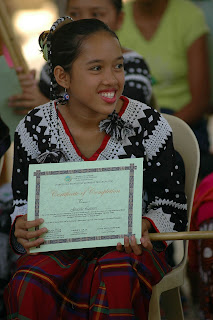
MALUNGON, SARANGANI PROVINCE (June 20, 2007)- Ms. Helen Lombos, chairperson of the Lamlifew Tribal Women’s Association (LTWA) applies finishing stitch patterns to a traditional B’laan dress in the terrace of a tradional B’laan house. Made of bamboo, wood and indigenous materials from the area, the B’laan traditional house constructed by the LTWA will soon showcase B’laan handicrafts and beadworks. Lamlifew is a tourist destination in Sarangani where one could experience the B’laan culture and witness their everyday life. (PHOTO BY SARANGANI INFORMATION OFFICE/CAS)
The association is technically assisted by the Indigenous Peoples Development Program (IPDP) under the Office of the Governor.Tourists visiting Lamlifew Tribal Eco-Village came to have a truly tribal interaction. School of Living Tradition cultural crafts are sold to the tourists. Some guests even requested for specific Blaan clothing like the ansif (cross-stitched dress), takmon (upper garment made of mother of pearl), mabal (woven abaca/hemp fiber) and some beaded dress. They also make traditional beads necklaces, head dress accessories, and basketry.
Visits to the community can be arranged thru the Office of the Governor - IPDP. Contact person is Maribeth Farnazo, Program Manager (+63-83-508-2258).












